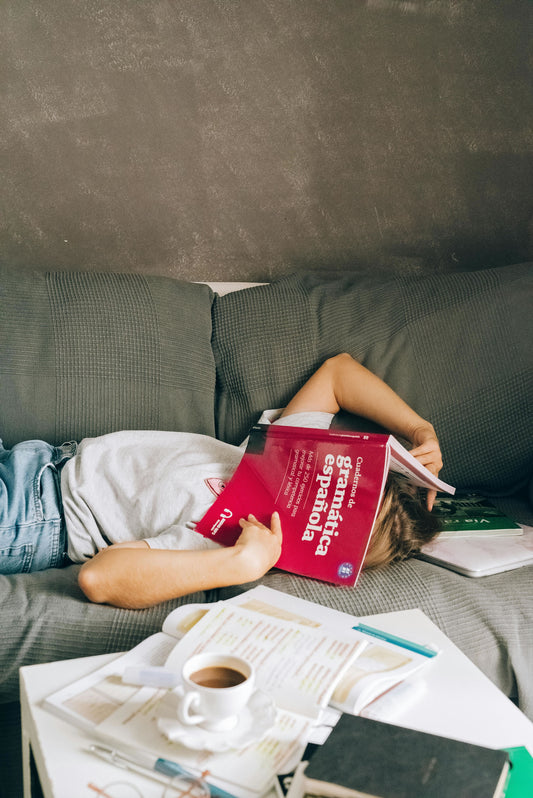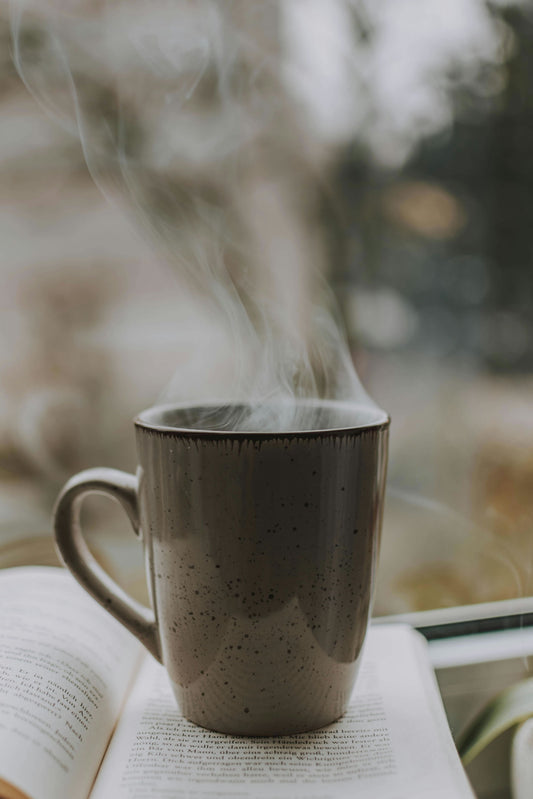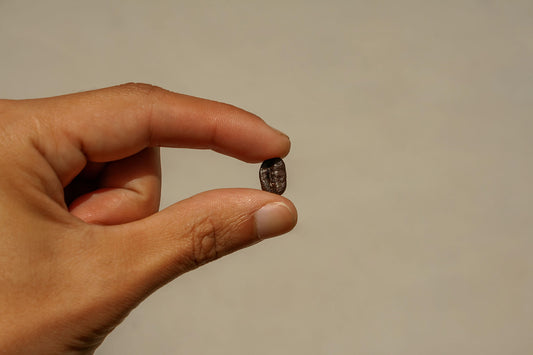Coffee is a necessity for the vast majority of Americans. Nearly two-thirds of Americans drink coffee daily, per the National Coffee Association.
It's because coffee gives you that little extra jolt of energy you need to get through the day.
However, not everyone becomes hyperactive after consuming caffeine. Caffeine can cause sleepiness, but why is that? The mystery can be solved.
Instead of asking "why coffee makes me tired?," you could instead ask "how does caffeine affect my body?"
Unveiling the Coffee Paradox
The Coffee-Sleep Paradox is a perplexing and widely recognized phenomenon that centers around the consumption of coffee and its anticipated versus actual effects on sleep.
Coffee, a popular beverage enjoyed for its stimulating properties, is primarily consumed to increase alertness and combat drowsiness.
However, the paradox lies in the fact that while coffee is expected to enhance wakefulness and productivity, many individuals often experience contrasting outcomes.
- Expected Effects of Coffee: Coffee, owing to its caffeine content, is believed to offer several benefits, including increased alertness, improved focus, and heightened energy levels. It is commonly consumed to counteract fatigue, boost cognitive function, and extend periods of wakefulness. This expected effect of coffee has made it a staple in the daily routines of countless people, particularly those who need to combat tiredness, such as students, professionals, and shift workers.
- The Reality Experienced by Some Individuals: Despite the apparent benefits associated with coffee consumption, the reality experienced by some individuals deviates from these expectations, giving rise to the Coffee-Sleep Paradox. For certain people, the intake of coffee, especially later in the day, can result in disrupted sleep patterns, increased restlessness, and difficulty falling asleep at night. This paradoxical outcome occurs because caffeine, a central nervous system stimulant present in coffee, can have a lingering effect on the body. In some cases, even a moderate dose of caffeine consumed in the afternoon or evening can lead to difficulties in achieving restful sleep, leading to sleep disturbances and reduced overall sleep quality.
Unveiling the intricacies of the Coffee-Sleep Paradox is essential for individuals who rely on coffee to maintain alertness while also ensuring a good night's rest. Understanding the factors influencing this paradox, such as caffeine sensitivity, timing of consumption, and individual differences, can help people make informed choices about their coffee consumption and sleep hygiene practices.
This exploration of the Coffee-Sleep Paradox aims to shed light on the complex relationship between coffee and sleep, emphasizing the need for a balanced approach to reaping the benefits of coffee without compromising the quality of one's sleep.
Role of Adenosine
The human body normally produces the neurotransmitter adenosine. Neurotransmitters are chemical messengers used by nerve cells to relay messages to one another. This chemical process includes adenosine receptors, which allow adenosine to join a cell & stimulate changes necessary for the body to enact specific biological functions.
The sleep move, or the need for sleep, is stimulated by adenosine. Adenosine has been shown to suppress inflammatory reactions and play a function in the immune system. Adenosine receptors have also been identified in the pulmonary, cardiovascular, and urinary systems.
As just a medication, adenosine slows the heart and helps control arrhythmias. In patients undergoing surgery, adenosine administration has been shown to decrease pain and blood pressure. Adenosine is not only effective as a treatment, but it can also be used diagnostically during one cardiac stress test.
Adenosine's Influence On Sleep
The sleep drive, also known as the sleep pressure, is elevated when adenosine levels are raised. The sleep drive aids in keeping one's body in a state of sleep-wake homoeostasis, or the optimal balance between the two.
A person's desire to sleep grows stronger the longer they go without sleep. In response to sleep deprivation, the sleep drive increases the depth and duration of the subsequent sleep session.
Adenosine frequently coexists with a molecule known as adenosine triphosphate (ATP). Since it can both store and release energy, ATP is often referred to as the "energy currency" of cells.
Adenosine is a byproduct of the breakdown of ATP that occurs as a person uses energy and moves about their day. Therefore, the greater a person's cellular energy expenditure, the greater their eventual need for sleep as adenosine is released.
Caffeine And Adenosine
Caffeine, found in coffee and a variety of teas, is by far the most widely consumed psychoactive substance.
Caffeine's ability to inhibit adenosine's effects is one mechanism by which it combats sleepiness. In the brain, caffeine acts as an adenosine antagonist by blocking adenosine receptors. Blocking the interaction of adenosine with these receptors reduces fatigue.
Effects of Caffeine Crash
You probably already know what we've been talking about if you consume a lot of caffeinated beverages.
Unfortunately, it makes you feel extremely tired and sleepy, irritable, and unable to concentrate.
The combination of dizziness, fatigue, and headaches can make it feel like you have a hangover.
It's not a good feeling at all, especially if you're drinking coffee to perk up because you're feeling tired.
Make The Switch To Lion's Mane Mushroom Coffee
Do you belong to the millions who hit the wall around 3 o'clock every day?
Not to worry; we understand. So that you can reap the benefits of your favourite coffee without suffering through the dreaded caffeine crash, we set out on a mission to discover how to prevent crashing from caffeine.
Drink A Lot Of Water
Despite the fact that water accounts for 97% of coffee's composition, consuming it won't actually rehydrate you.
Even though it's no longer widely believed that coffee will cause dehydration, it does have a mild diuretic effect. Because of this, you can expect to experience a loss of fluids.
Therefore, water is the best choice to replenish those fluids.
But the benefits of water consumption go far beyond that. Drinking water with your coffee has been shown to prevent an energy slump by increasing your overall fluid intake.
Have A Restful Night's Sleep
A good night's sleep is another way to prevent an adenosine overload in the brain after consuming coffee.
Adenosine levels in the brain are naturally higher when you're tired. If you drink coffee while in this state, you can expect a severe caffeine crash.
Numerous strategies exist to facilitate a restful evening. To begin, avoid caffeine after 6 o'clock! The half-life of caffeine is approximately five hours.
This means that you'll stay awake for another four to five hours after taking it. Avoid falling into the trap of relying on coffee to keep you awake at night and then needing more morning caffeine.
To aid in a restful night's sleep, you can also:
- Putting the screen down before bedtime
- Enjoying some downtime with a calming podcast
- Maintaining a regular bedtime routine
Some people are perfectly fine sleeping shortly after drinking coffee, while others need to wait a few hours.
Spread Your Caffeine Consumption
Spreading out your coffee consumption throughout the day can also help you avoid a midday slump in energy.
Make certain that there are at least two hours amongst each caffeinated drink instead of chugging them back to back.
Because the caffeine will be released gradually over a longer period of time, your energy levels will be more consistent and less prone to sudden drops. You won't induce a "jittery state," but rather a sustained sense of heightened awareness.
After breakfast and lunch, respectively, is the best time for your first cup between 9:00 and 11:30 am and your second cup between 1:00 and 2:00 pm.
Eat Healthily
Also, it's best to consume coffee after a meal. Many factors contribute to this. Firstly, eating well provides you with a steady supply of healthy fuel to keep you going all day.
Caffeine, on the other hand, only works temporarily. When you consume coffee in place of a meal, your body will rely solely on this temporary source of fuel, which will soon be depleted.
If you eat before you drink coffee, you'll have two energy boosters in one.
Decaf Coffee Can Help You Avoid The Caffeine Crash
Finally, eliminating caffeine from your diet is the most reliable method for preventing energy lows caused by caffeine withdrawal.
While we don't think you should ever give up coffee altogether, we do think you should try switching to decaf for at least some of your daily cups.
We understand that decaf coffee has a poor reputation, but speciality decaf coffees are on par with their caffeinated counterparts in terms of flavour.
We've written an entire blog post dedicated to ground decaf coffee, explaining why it's got a bad rap and why you should try our premium blend.
Caffeine Substitutes From Plants
So, you don't have to limit yourself to decaf coffee to avoid the dreaded caffeine crash.
If the idea of a caffeine-free coffee replacement leaves you cold, perhaps an energy boost from the top vegan protein powder also on market will change your mind.
Avoiding that energy slump is easy with Jrny shakes because they contain a variety of natural ingredients in place of caffeine, such as Iron, B12, B6, Vitamin C, and more.
It is also one of the best magnesium supplements available due to the high concentration of magnesium it contains.
Balanced Mushroom Supplements
Considering alternative energy-boosting supplements for Balance, such as those containing mushrooms, is a great way to avoid the dreaded caffeine crash.
For instance, Lyfefuel uses a proprietary blend of antinociceptive mushrooms and traditional medicinal herbs that has been shown to increase resistance to stress, normalise hormone levels, and lessen feelings of being overwhelmed.
It can be difficult to consume adaptogenic mushrooms & medicinal herbs due to their notoriously bitter taste.
Here's where capsules come in handy; they make attaining that heightened state of wellness simple and take the bitterness out of the experience.
Coffee and Its Diuretic Nature
When it comes to hydration, nothing beats water. However, if you're trying to stay hydrated, caffeinated beverages can help.
Individuals have varying water requirements. The amount of water you need depends on your age, size, and level of activity. The amount of water you need to consume can also be affected by factors such as your environment, access to air conditioning during hot weather, and whether or not you work inside or outside. The body loses water through breathing, urinating, and perspiring.
As a chemical, caffeine increases production of urine, which means caffeine is a diuretic. But most research suggests that the fluid in caffeinated drinks balances the diuretic effect of typical caffeine levels. High doses of caffeine taken all at once may increase the amount of urine the body makes. Caffeine inexperience makes this more likely.
You can get a caffeinated drink at any time of the day. Therefore, it is crucial that you read the labels on such drinks. That should keep your overall caffeine consumption within healthy limits. The FDA in the United States has established a safe daily intake of caffeine.
Adults can only safely consume 400 milligrammes per day. For others, no safe upper limit has been established. According to the American Dietary Guidelines, children under the age of two should not consume any beverages containing caffeine. They also advise expecting and nursing mothers to consult their doctors about caffeine consumption.
Serious health problems have been linked to daily caffeine intakes of more than 10 milligrammes per kilogramme. A daily caffeine intake of 750 milligrammes for a 165-pound (about 75-kilogram) person is considered extremely high.
People have reported chest pain, irregular heartbeat, and stroke after consuming this much caffeine. The Food and Drug Administration reports that 1,200 milligrammes of pure caffeine can cause caffeine poisoning. In powder form, that amounts to a little under a half teaspoon.
Insomnia, diarrhoea, and stomach distress are also common complaints following consumption of caffeinated beverages.
If you want to stay hydrated, water is your best bet. It has no calories, no caffeine, is cheap, and can be found anywhere.
Coffee's Influence on Sugar Levels
That said, other compounds in coffee — notably magnesium, chromium, and polyphenols — may play a role in improving insulin sensitivity, which may offset the effects of caffeine.
Because of this, some experts suggest that people with diabetes drink decaffeinated coffee — to get the benefits of components such as antioxidants and minerals without affecting insulin sensitivity.
Psychological Factors
The caffeine in coffee stimulates the brain and nervous system. Awakeness, concentration, and the ability to solve problems are all enhanced. There is some evidence that consuming caffeinated beverages like coffee can help you feel more alert and focused during an exam if you are someone who 'uses' them in this way.
Caffeine was found to have a "striking improvement" on memory tests administered first thing in the morning, which is typically a "low" time for young adults, according to a study conducted on college students. It appears to be due to a direct effect on memory, rather than via a boost to general arousal; a separate group of participants who were asked to do some exercise did not show this benefit.
Published studies from the past year added to the long list of advantages seen with visual processing. Caffeine enhanced the participants' ability to detect moving targets, which could help in a variety of situations, from avoiding a pedestrian crossing the street to intercepting a bouncing ball during a game of five-a-side football.
Individual Tolerance to Caffeine
Caffeine tolerance develops similarly to that of other drugs. As a result, you'll need to take increasingly large doses to maintain the initial effects. You may come to rely on caffeine for both mental and physical performance in the long run.
Caffeine withdrawal symptoms can occur if someone who is dependent on the drug suddenly stops consuming it. Examples of this could be:
- fatigue
- crankiness
- persistent headache
- sweating
- muscle pain
- anxiety.
Caffeine withdrawal symptoms can start anywhere from 12 hours to a full week after your last dose.
Reducing your caffeine intake gradually is the most manageable method for quitting cold turkey. Your nervous system will have time to prepare for normal operation without the drug in its system.
Decaf Coffee’s Unexpected Effects
We all need that first cup of coffee in the morning to get going. If you can't drink regular coffee due to caffeine sensitivities, decaf is a popular substitute.
You should know that decaf coffee does have some negative effects. There are some negative effects, but it does not cause dehydration or a rapid heart rate as is commonly believed.
Heart Complications Could Occur
Caffeine-free coffee may raise LDL cholesterol levels (LDL cholesterol). The caffeinated version did not have these results. One type of blood fat associated with metabolic syndrome was found to be elevated in people who drank decaf coffee.
Decaffeinated coffee was not found to reduce the risk of heart attack in a separate study.
Decaf coffee might not be dangerous on its own, but the chemicals used to remove the caffeine might be. Methylene chloride is one possible carcinogenic solvent used to extract caffeine.
In healthy people, drinking two cups of decaf coffee daily may not be harmful.
However, the Food and Drug Administration (FDA) recommends staying away from decaf if you have a severe reaction to caffeine.
Decaffeinated coffee may have a marginally beneficial effect on blood pressure when regular coffee is substituted.
Rheumatoid Arthritis May Be Exacerbated
Rheumatoid arthritis risk was found to be higher in people who drank decaf coffee. To my surprise, drinking coffee with caffeine in it did not increase my risk.
The method used to remove caffeine from coffee could be at the root of the problem. To confirm this theory, more research is required.
Acidity Is A Possibility
There was an uptick in serum gastrin levels among those who drank decaf coffee. The hormone called gastrin is responsible for secreting acid from the stomach. In extreme cases, this can cause acid reflux.
Regular coffee, on the other hand, was found to exacerbate symptoms of gastroesophageal reflux disease. When the coffee was caffeine-free, the effect subsided.
Iron Absorption May Be Impair
Chlorogenic acid is present in both caffeinated and decaffeinated coffee. It was discovered that chlorogenic acid impedes the absorption of nonheme (plant-based) iron.
Headache And Drowsiness May Occur
It's possible that these are additional withdrawal symptoms. Regular coffee drinkers may have adverse reactions to decaf coffee, including drowsiness, fatigue, and headaches.
Many of us rely on a cup of coffee in the morning to get us going, as stated by Eva De Angelis, a dietitian nutritionist with a bachelor's degree in Nutrition and Dietetics from ISalud University:
"Caffeine can stimulate our central nervous system. If you're used to drinking caffeinated coffee, switching to decaf may cause "withdrawal" symptoms.
Let's say you've developed a habit of consuming caffeine regularly. If this is the case, switching to decaf may cause temporary symptoms such as headaches, fatigue, depression, and increased irritability while your body adjusts to functioning on less caffeine.
Methylene chloride, used in the decaffeination process, may also be a cause for concern. Some studies have shown that exposure to this chemical can cause temporary central nervous system slowing, which manifests itself in symptoms like headache, drowsiness, and nausea.
Sleep Disorders and Coffee
Caffeine consumption has been linked to a delayed sleep onset, reduced sleep duration, and a less restful sleep quality. It can also lessen the amount of restorative slow-wave sleep, which is essential for waking up feeling refreshed.
In the brain, caffeine works by inhibiting adenosine receptors. The brain produces the sleep-inducing chemical adenosine while we are awake. The longer you stay awake, the more adenosine your brain produces.
The more of it there is, the more sleepy you'll feel. Caffeine inhibits this process, keeping you wide awake and on guard. It's possible that this is also why caffeine is so disruptive to sleep.
Daily Coffee Consumption Limits
The Food and Drug Administration recommends that healthy adults consume no more than 400 milligrammes of caffeine per day, which is equivalent to about four or five cups of coffee.
However, there is a wide range in how susceptible people are to caffeine's effects and how quickly it is metabolised (break it down).
Caffeine's effects may be amplified in some people due to preexisting conditions or the use of certain medications. Also, if you are pregnant, trying to get pregnant, breastfeeding, or concerned about any other condition or medication, you should discuss your caffeine intake with your doctor.
Caffeine and other stimulants are not recommended for children and adolescents, but the FDA has not established a safe limit for them.
Incorporating Juju Blends for Energy
Incorporating Juju Blends products for an energy boost is a smart choice for those seeking sustained vitality without the undesirable side effects of sleepiness. Juju Blends specializes in crafting unique, all-natural formulations that harness the power of adaptogens, superfoods, and other potent ingredients.
These products are carefully designed to provide a gradual and steady release of energy throughout the day, avoiding the notorious energy crashes associated with caffeinated or sugary alternatives.
By choosing Juju Blends, you can tap into the harmonious synergy of ingredients like maca, ashwagandha, and spirulina, which work to enhance mental alertness, combat fatigue, and support physical endurance, all while maintaining a balanced and stable energy level.
This makes Juju Blends the ideal solution for those who wish to stay energized and focused without the subsequent drowsiness that often follows traditional energy-boosting options.
Frequently Asked Questions
Why does coffee make me sleepy immediately?
Coffee contains stimulating caffeine, but it has its limits. You might feel tired as you feel the effects of adenosine build-up, dehydration, decreased blood sugar, and more. The reasons you feel sleepy can vary, but the solution might be getting a better night's sleep by watching what you eat before bed.
Why coffee doesn't keep me awake?
Caffeine works by temporarily blocking the adenosine receptors in your brain. But if you haven't been meeting your sleep need, you'll have a lot of adenosine in your system, meaning you'll feel the sleepiness effect of the chemical, even with caffeine in your system.
Why does caffeine make ADHD sleepy?
Caffeine interacts with a molecule in the body called adenosine , which assists with communication between brain cells and acts as a nervous system depressant. Adenosine levels increase throughout the day and help promote feelings of drowsiness.
How long does coffee effect last?
The level of caffeine in your blood peaks about one hour later and stays at this level for several hours for most people. Six hours after caffeine is consumed, half of it is still in your body. It can take up to 10 hours to completely clear caffeine from your bloodstream.
How do you know if caffeine is working?
Caffeine is well absorbed by the body, and the short-term effects are usually experienced between 5 and 30 minutes after having it. These effects can include increased breathing and heart rate, and increased mental alertness and physical energy. Depending on the individual, these effects can last up to 12 hours.
Conclusion
The article delves into the intriguing phenomenon of feeling sleepy after consuming coffee, a beverage primarily known for its wakefulness-inducing properties. It begins by highlighting the widespread reliance on coffee to combat fatigue and increase alertness, a practice deeply ingrained in our daily routines.
However, it goes on to elucidate the counterintuitive observation that for some individuals, coffee seems to have the opposite effect, making them feel lethargic and drowsy. The article explores the science behind this paradoxical response, explaining that coffee's stimulating effects are often short-lived, and the subsequent crash in energy levels can lead to sleepiness in some people.
Factors such as caffeine sensitivity and the timing of coffee consumption are discussed to shed light on why coffee might induce drowsiness in certain individuals. In conclusion, the article delves into the complex interplay of biochemical and physiological factors that underlie the question, "Why Does Coffee Make Me Sleepy."
It emphasizes that while coffee remains a valuable tool for alertness in most cases, understanding individual differences and moderation is key to optimizing its energizing benefits.




